Author: Richard Laycock
Translated by: TechFlow
Key Points
2025 price prediction: Experts predict an average price of $4,308 for Ethereum by the end of 2025.
Peak and trough predictions: The remainder of 2025 may experience significant fluctuations, with an average peak price forecast of $4,746 and a minimum forecast of only $1,940.
Long-term outlook: Experts believe Ethereum will continue to rise, predicting a price of $10,882 by 2030 and reaching $22,374 by 2035.
Should you buy ETH: The majority of experts (57%) believe now is a good time to buy Ethereum.
Is Ethereum undervalued: Nearly half of the experts (43%) believe Ethereum is currently undervalued.
Disclaimer: This article does not constitute financial advice or recommendations for digital assets or services. Digital assets are highly volatile and risky, and past performance does not guarantee future results. Potential regulatory policies may affect their availability and related services. Please consult a professional financial advisor before investing. Finder and the authors may hold cryptocurrencies mentioned in this article.
Finder analyzes expert price predictions every quarter. At the end of June 2025, we surveyed 24 crypto industry experts to gather their views on Ethereum's (ETH) performance through to 2035.
All prices mentioned in this report are in US dollars.
The expert group predicts an average price of $4,308 for Ethereum by the end of 2025, followed by an increase to $10,882 by the end of 2030, and further rising to $22,374 by 2035.
Ethereum (ETH) price predictions: Outlook for 2025, 2030, and 2035
According to experts' predictions, Ethereum's price will reach $4,308 by the end of 2025, rise to $10,882 by the end of 2030, and further climb to $22,374 by the end of 2035, which is more optimistic than the $4,153 predicted in the April 2025 report.
Experts predict that Ethereum (ETH) will reach $10,882 by 2030 and rise to $22,374 by 2035. Similar to the 2025 forecast, this expert group's expectations are slightly optimistic, higher than the average predicted value of $9,495 for ETH in 2030 and $17,042 for 2035 as per our April 2025 survey.
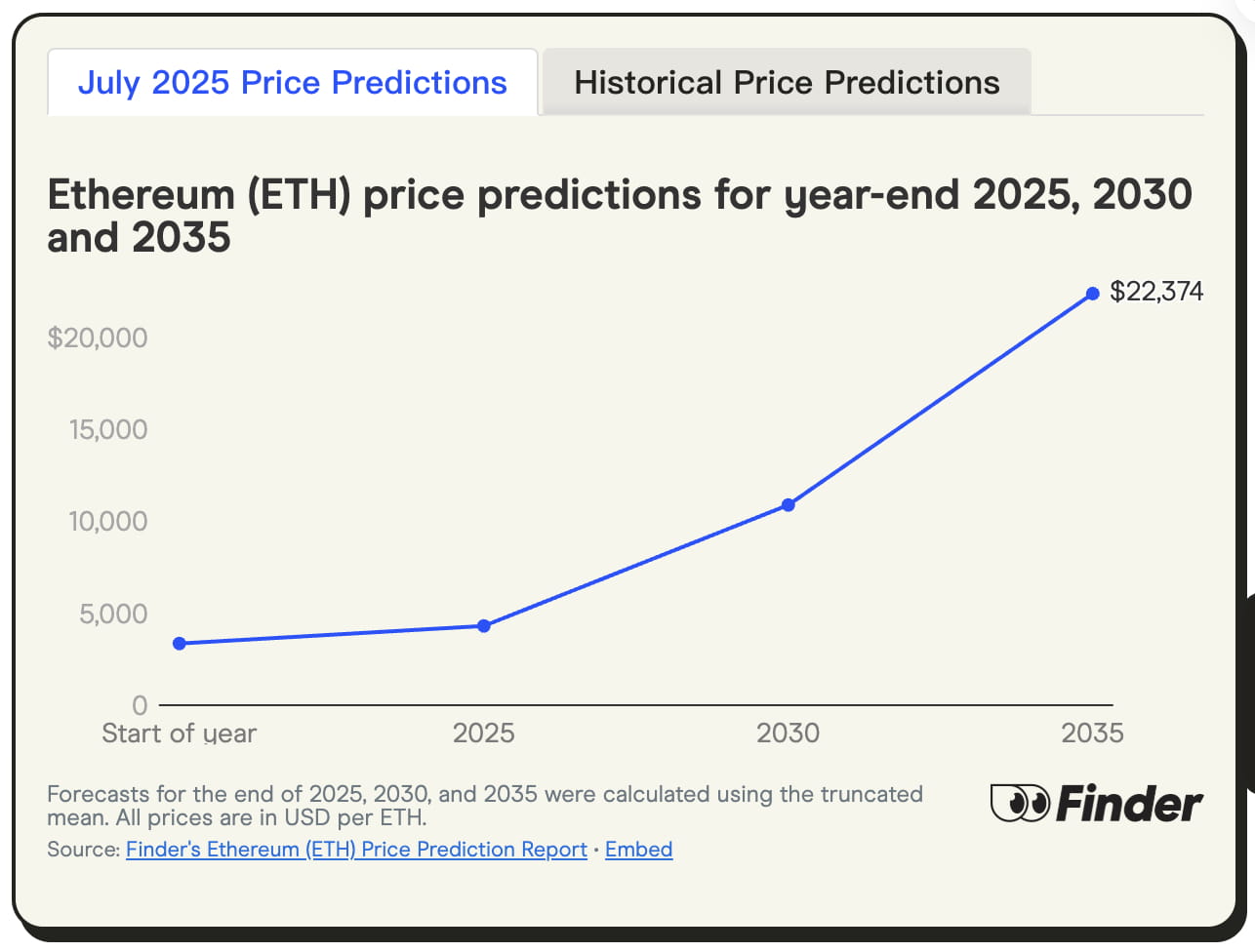
Johnny Gabriele, Chief Analyst of Lifted Initiative Blockchain Economy and AI Integration, predicts that Ethereum's price will reach $10,000 by 2025 and compares Ethereum to 'global assets like oil.'
Gracy Chen, CEO of Bitget, states that Ethereum is at the core of decentralized finance (DeFi) and has bright prospects due to its scalable Layer-2 solutions.
These price predictions stem from Ethereum's role as a core pillar of decentralized finance (DeFi), with its applications in real-world asset (RWA) tokenization expected to reach $16 trillion by 2030. Furthermore, the increased transaction speed following the Dencun upgrade has also facilitated Ethereum's widespread use in payment systems. Strong institutional interest along with Ethereum's scalable Layer 2 solutions further enhances its future prospects.
Ben Ritchie, Managing Director of Alpha Node Global, predicts that Ethereum's price will reach $6,000 by 2025 and emphasizes institutional investor interest.
Our view is based on strong growth in institutional interest, especially driven by Ethereum spot ETFs (Exchange-Traded Funds), and Ethereum's increasingly expanding role in the custody of real-world assets (RWA). In short, RWA needs a solid and reliable core infrastructure, and Ethereum and its Virtual Machine (EVM) have proven their industry leadership in long-term practice.
Josh Fraser, co-founder of Origin Protocol, has a fairly optimistic view of Ethereum's (ETH) potential in 2025, predicting its price will reach $9,000 and stating that Ethereum has the potential to surpass Bitcoin's market cap in the long term.
"Ethereum is a global computer with almost limitless application scenarios. Demand for Ethereum comes from ETFs, coupled with the locked amount of ETH for staking, which is expected to rise further by 2025."
On the other hand, John Hawkins, a senior lecturer at the University of Canberra, holds a more conservative view, predicting Ethereum's price to be only $1,500.
"While Ethereum is technically more advanced and has a lower environmental impact, its price is highly correlated with Bitcoin's."
2025 Ethereum price range prediction
The expert group predicts that Ethereum (ETH) will reach an average peak price of $4,746 by 2025, with some predictions suggesting it could go as high as $14,260.
More than two-fifths (43%) of experts believe that ETH's price will peak between $2,000 and $3,999 by the end of 2025; while one-third (33%) of experts expect its price to reach between $4,000 and $5,999 during the same time frame.
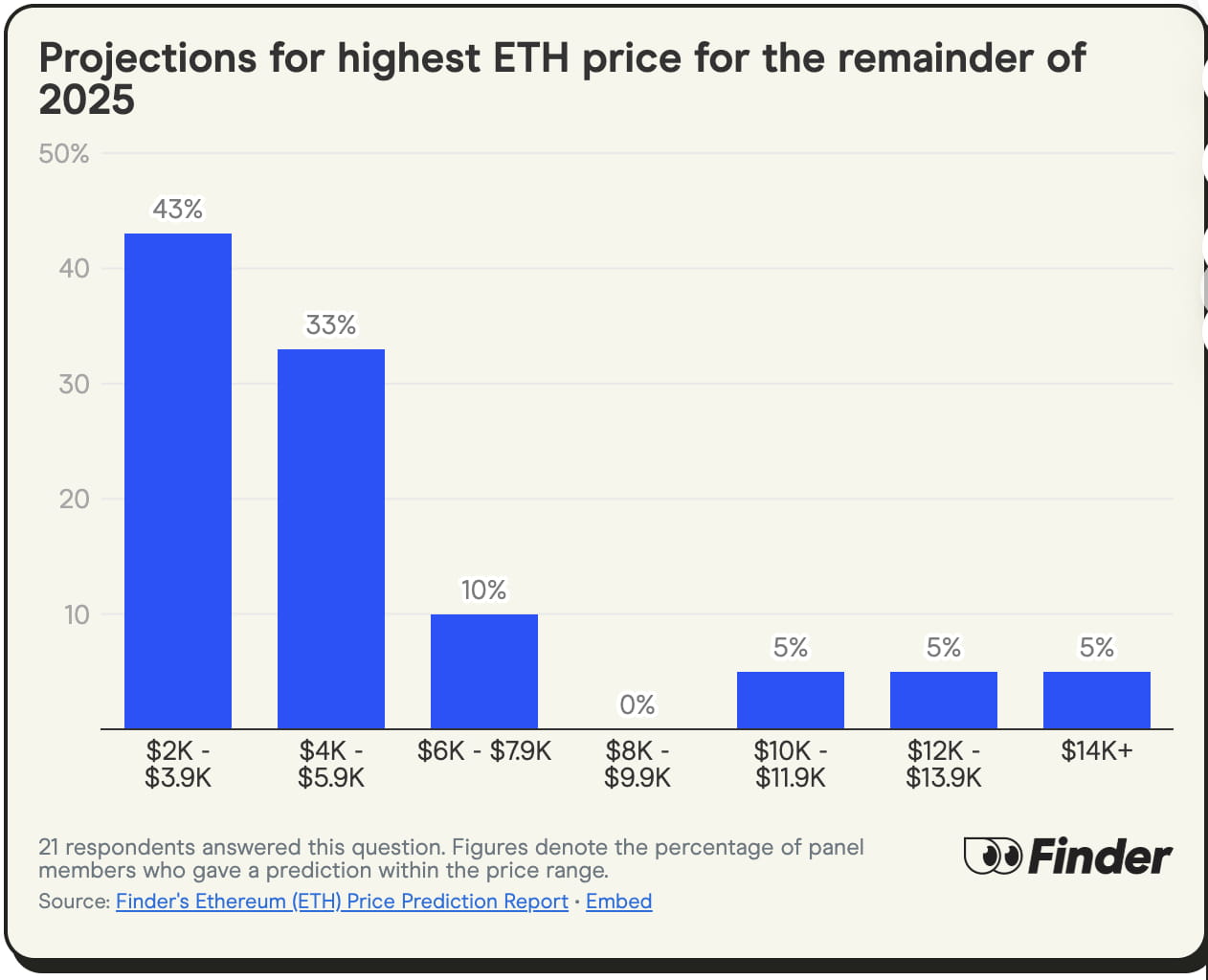
Martin Froehler, CEO of Morpher, holds an extremely optimistic view of Ethereum (ETH) in 2025, predicting its price will reach $7,500 as Ethereum is seen as the preferred platform for tokenizing real-world assets.
"Ethereum is currently the most decentralized blockchain and the preferred choice for tokenizing real-world assets."
Nicole DeCicco, CEO of CryptoConsultz, provided the highest forecast of $5,200, stating that due to institutional investor involvement, Ethereum will remain strong in the long term.
"Ethereum remains one of the most reliable and widely used platforms in the crypto space, especially for real-world applications. The recent Pectra upgrade has brought necessary improvements in transaction speed, wallet security, and validator performance. Its infrastructure is utilized by major players like BlackRock and PayPal, who would not bet on a platform without long-term potential. Combined with this widespread adoption and ongoing scaling progress, Ethereum still has tremendous growth potential."
Low-end prediction
Average minimum price: The expert group predicts that Ethereum's average minimum price for 2025 will be $1,940, with some forecasts even lower, at $1,390.
Bottom range: More than half of the experts (52%) believe that Ethereum's minimum price for the remainder of 2025 will be between $2,000 and $2,249.
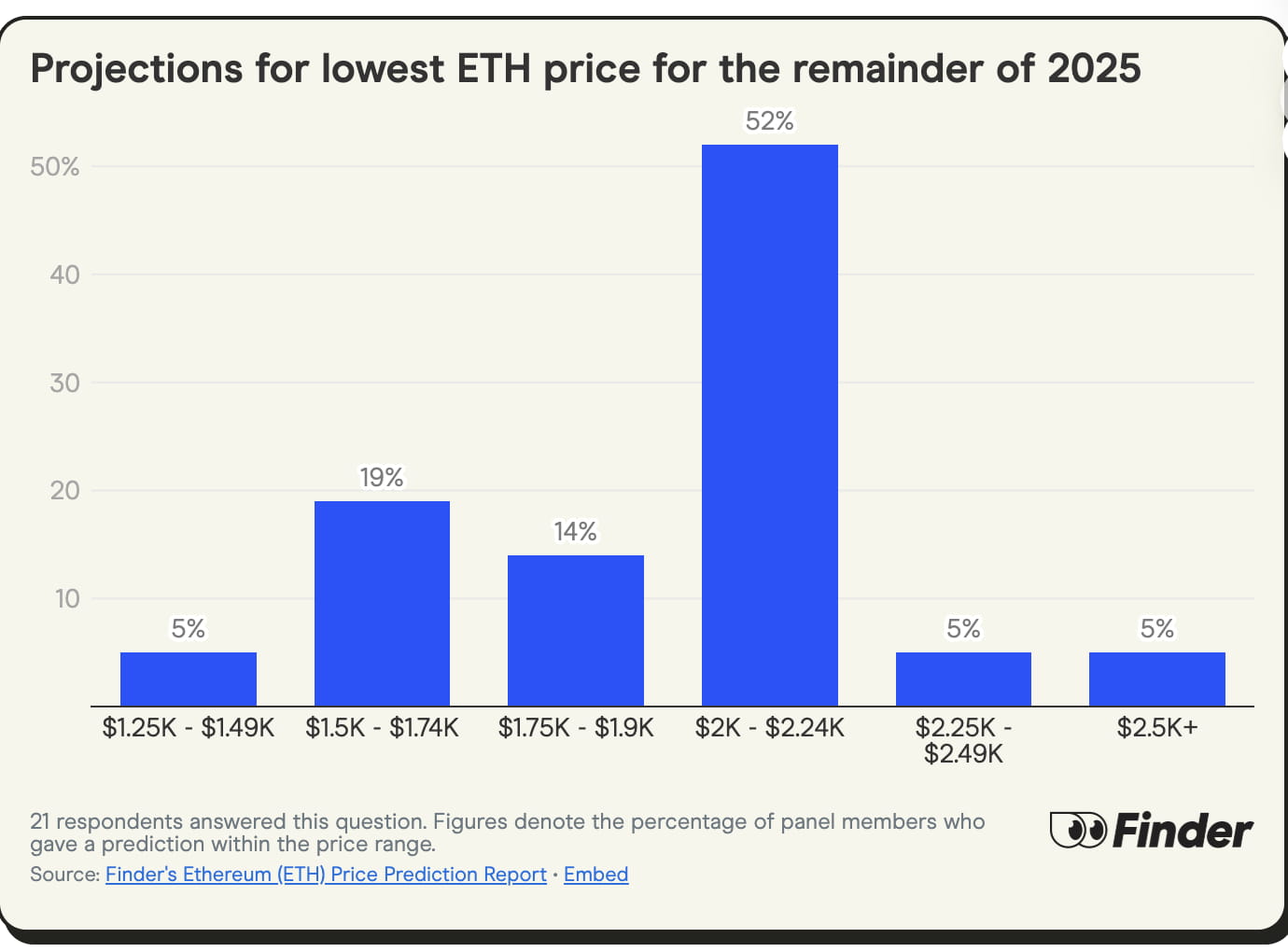
Ruadhan O, founder of Seasonal Tokens, states that 2025 may present many unfavorable factors for Ethereum (ETH), predicting that its price may drop to $2,000 before the end of the year.
Ethereum fell to $2,200 during the recent outbreak of war, showing that its current price support is weaker than Bitcoin's (BTC). Since the peak post-December elections, Ethereum's price has declined by 40%. Without unexpected positive news in the coming months, the likelihood of breaking through $4,000 within 2025 is low.
Daniel Keller, CEO of InFlux Technologies, believes that stagnant gas fees may negatively impact Ethereum's price, predicting its minimum price could drop to $1,500.
Currently, Ethereum (ETH) is in an oversold state, and there is still room for price increases. However, stagnant gas fees may negatively impact it, so I predict only a slight increase in price by the end of 2025.
Is now the best time to buy, hold, or sell Ethereum (ETH)?
Ethereum's current trading price is below its January 2025 peak, which may prompt 57% of experts to believe now is a good time to buy Ethereum; 26% recommend holding, while 17% advocate selling.
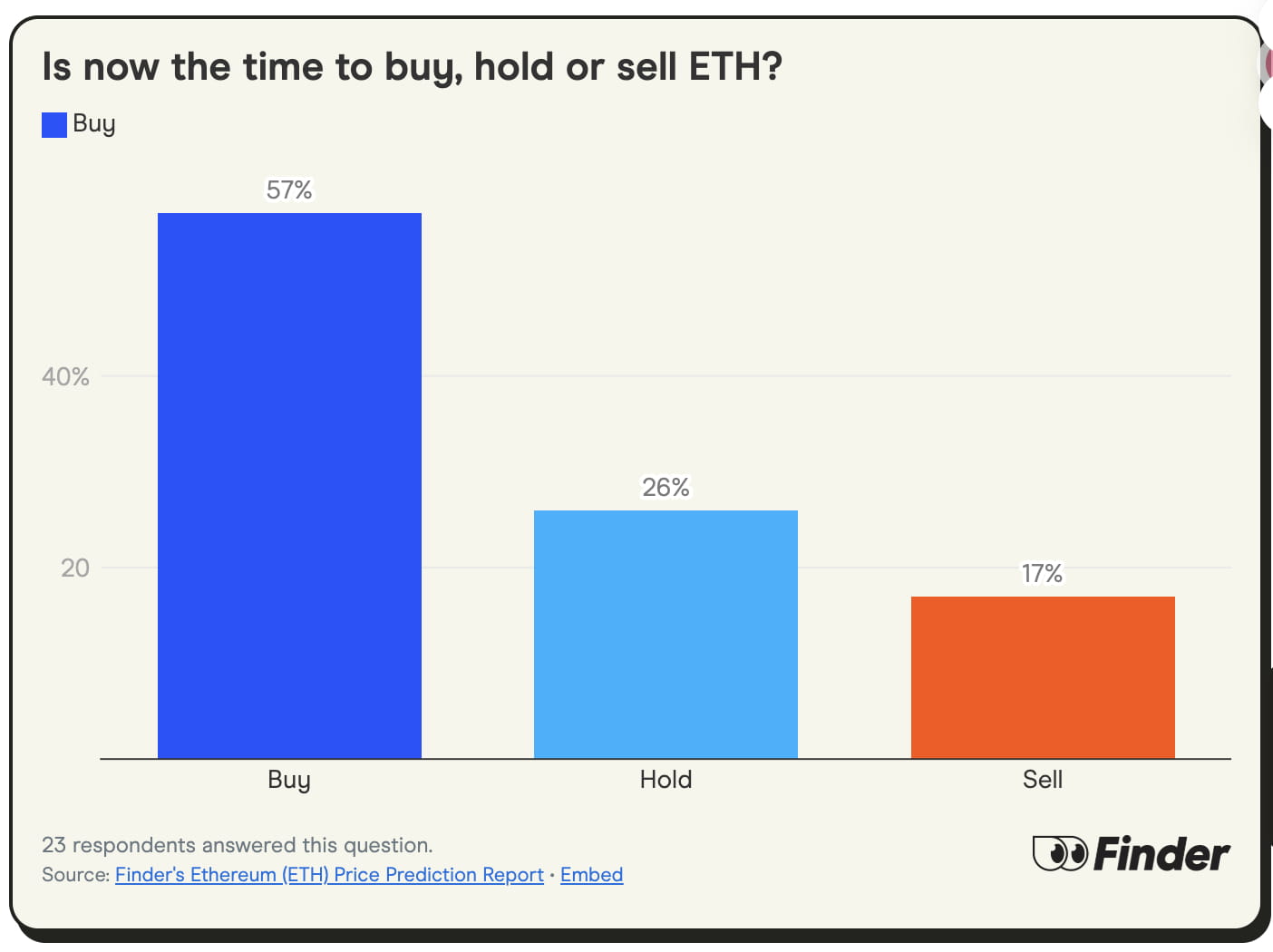
Ruslan Lienkha, head of the market at YouHodler, believes that Ethereum is a worthwhile asset to buy because it is the leading blockchain for stablecoin issuance.
Ethereum remains the leading blockchain for stablecoin issuance and non-financial applications in the broader economy. At the same time, it is still the second-largest cryptocurrency by market cap and is widely considered more decentralized than its closest competitors.
Miles Paschini, CEO of FV Bank, states that Ethereum (ETH) should be held because it "remains the dominant decentralized network and has strong usage rates across multiple domains as well as in Layer 2 support."
Joseph Raczynski, a futurist at JT Consulting & Media, also supports the hold perspective, stating:
70% of stablecoin trading occurs within the Ethereum ecosystem, including the top two stablecoins: Circle's USDC and Tether's USDT. With the passage of the (GENIUS Act), most companies in the U.S. will have new channels to attract more users. This is an undervalued key moment that will have a significant positive impact on Ethereum (ETH) in the future.
Desmond Marshall, Managing Director of Rouge International and Rouge Ventures, stated that ETH should be sold and provided no positive comments regarding the token.
"ETH has been disappointing. Regardless of market conditions, its price has hovered around a maximum of $2,600. I have consistently pointed out that ETH is severely manipulated; it does have functionality as a token... but as a financial asset, it is worthless."
Is Ethereum (ETH) currently overvalued, undervalued, or fairly valued?
Approximately 43% of the expert group believes Ethereum is currently undervalued, 35% think the price is fair, and 22% believe the price is too high.
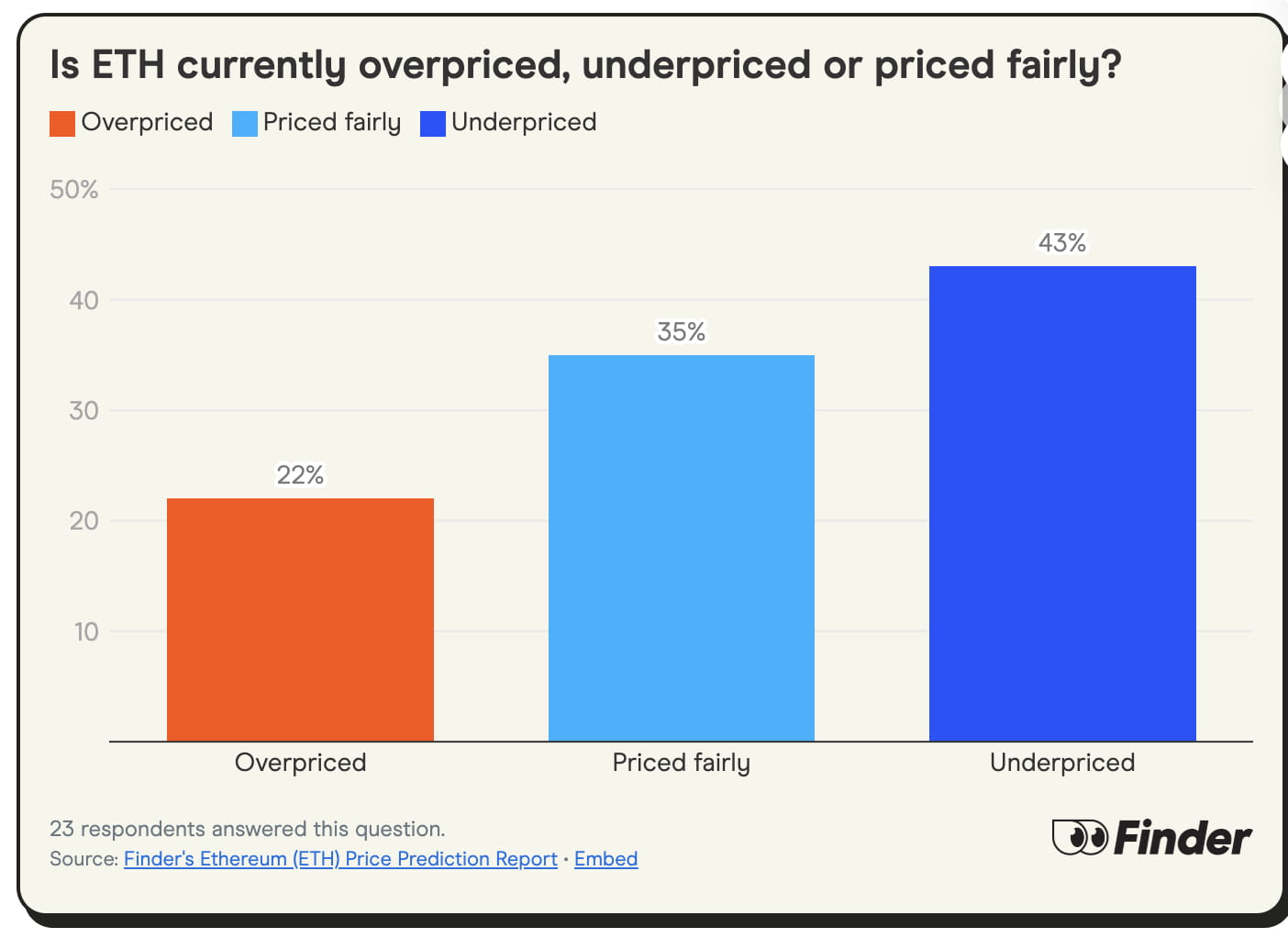
Kadan Stadelmann, Chief Technology Officer of Komodo Platform, believes that Ethereum's price depends somewhat on Bitcoin's performance, but institutional adoption and ETF news will drive its price up. He thinks that Ethereum is currently undervalued.
Despite significant progress and growth in the market over the past few years, Ethereum (ETH) remains a major altcoin that follows Bitcoin's trends. As we enter the final stages of this bull market, ETF news and institutional interest in Ethereum will continue to drive market activity upward.
John Murillo, Chief Business Officer of B2BROKER, believes that Ethereum's current price is fair.
Ethereum is facing fierce competition from cheaper DeFi protocols like Solana, Stellar, Uniswap, and other tokens. Although Ethereum is undergoing several upgrades (including Pectra and Danksharding), the high gas fee issue remains unresolved, casting doubt on the market's expectations for its future performance. However, as a significant cryptocurrency, Ethereum will continue to participate in market fluctuations in line with overall market trends.
Mitesh Shah, founder and CEO of Omnia Markets, stated that Ethereum's price is currently reasonable, mainly due to the launch of ETFs and the growth of the RWA (real-world assets) market:
The recent launch of spot ETFs has attracted over $4.2 billion in cumulative net inflows, creating a significant and sustained new demand source for this asset. At the same time, the real-world asset (RWA) tokenization market on Ethereum has grown to over $24 billion, solidifying its position as the primary settlement layer for this multi-trillion dollar opportunity. This increasing practicality, combined with the network's deflationary token burn mechanism and clear technological roadmap, provides a strong basis for Ethereum's long-term positive valuation.
Driving forces behind institutional adoption
Ethereum remains the preferred blockchain for institutional players, despite competition from ecosystems like Solana. Currently, over 50 non-crypto companies, including global financial giants like BlackRock, PayPal, and Deutsche Bank, are conducting business on Ethereum and its Layer 2 networks.
So, what drives institutional adoption of Ethereum?
Broad financial integration: 92% of experts believe that the application of Ethereum solutions in traditional finance (such as asset tokenization, stablecoins, and real-world assets) is the primary reason for its widespread institutional adoption.
Launch of ETFs: 71% of experts point out that the launch of Ethereum ETFs is a key factor driving institutional adoption.
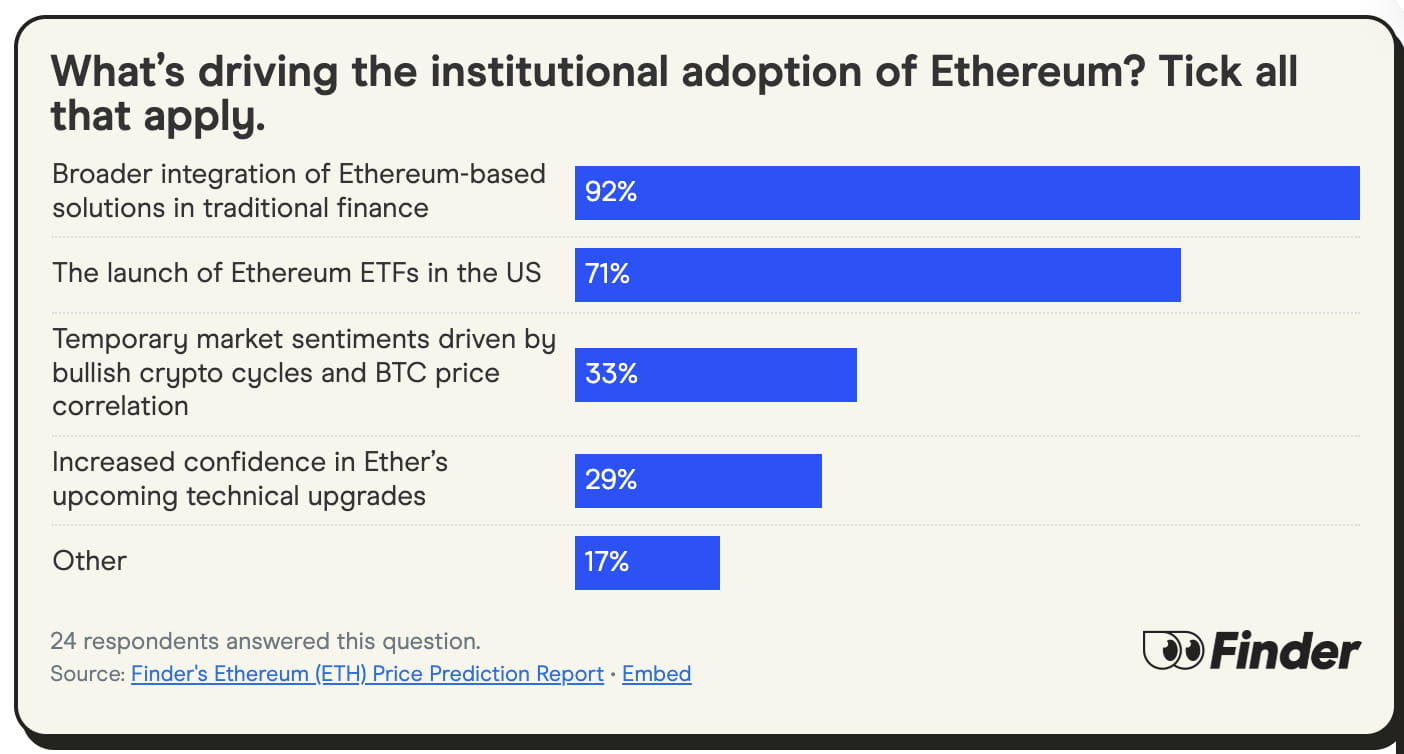
What is your view on the future of decentralized AI on Ethereum?
Decentralized AI platforms on Ethereum are beginning to emerge, but reportedly face challenges in competing with centralized services due to technological and economic hurdles. Experts have varied views on the future of this field:
Regarding the future of decentralized AI on Ethereum, the expert group's opinions are relatively balanced. One-third (33%) hold a neutral stance, believing that decentralized and centralized models will coexist to meet different needs.
A slightly smaller number (29%) of experts hold an optimistic view, believing that technological advances will overcome current challenges; meanwhile, another 29% of experts express skepticism, believing centralized platforms will maintain dominance.
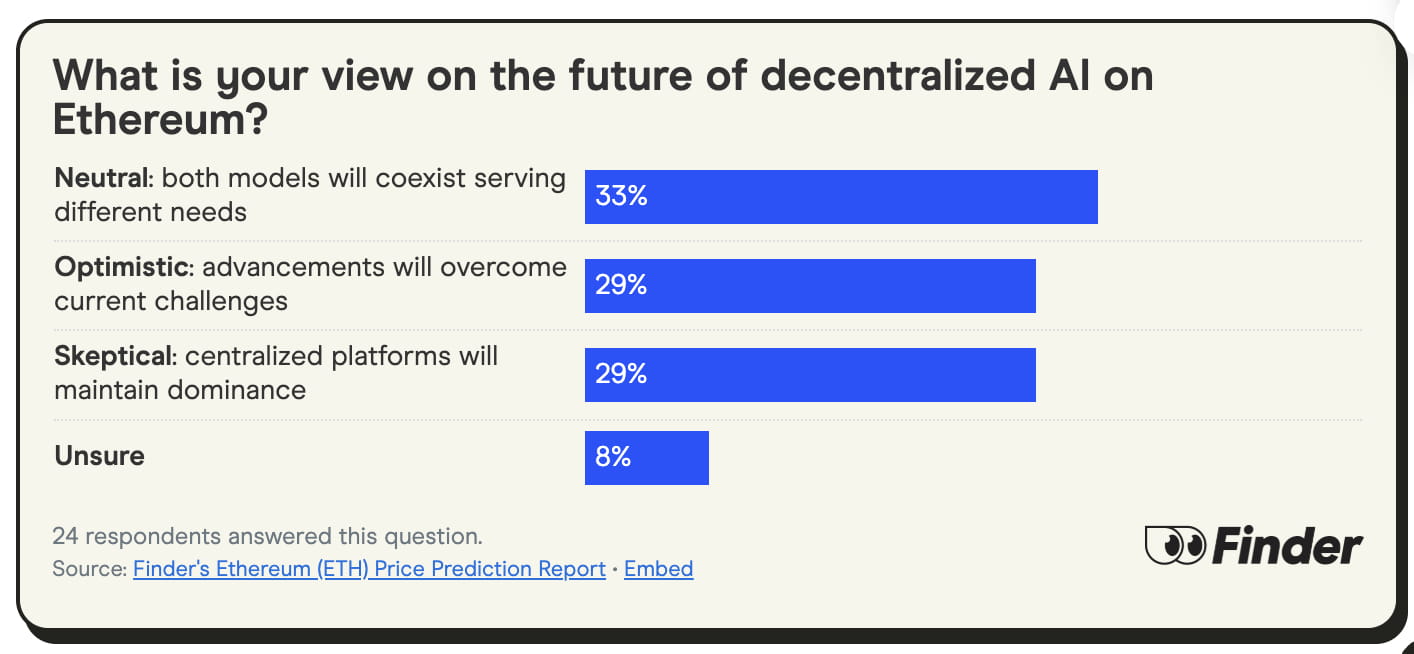
Expert Team




